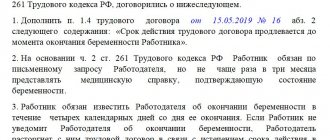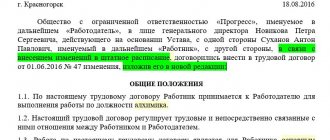Contract extension: registration methods
Important!
If the parties to the agreement decide that they should continue interaction within the framework of an agreement that is already ending, then they should extend (prolong) the corresponding agreement. Depending on the requirements of the law in relation to a particular type of contract or agreement of the parties, the extension is carried out using one of the following methods:
- Signing a new agreement. In this situation, its participants can approve not only a new validity period, but also fundamentally new parameters of the agreement (Article 421 of the Civil Code of the Russian Federation).
- Signing an additional agreement to the original contract. Such a document indicates the period for which the contract is extended. It is also not prohibited to adjust other terms of the agreement at the discretion of the parties (you can read more about this in our article Additional agreement on extending the term of the contract).
- Automatic renewal by force of law. Certain types of agreements are extended by default due to legal requirements. For example, a management agreement for an apartment building (clause 6 of Article 162 of the Housing Code of the Russian Federation), etc.
- Automatic renewal by joint decision of the parties. The parties to the agreement can themselves, without special instructions in the legislation, agree on the automatic renewal of the agreement. In this case, a sequence of actions is agreed upon, the implementation of which would mean that the party does not want to renew the relationship after the expiration of the contract, and in case of non-fulfillment of which, accordingly, the agreement is subject to automatic renewal.
When is it needed?
Extension of the validity period is subject to all reasonable agreements, and each party decides in advance what period it is interested in. At the same time, there are a number of relations, mainly of a civil and social nature, where the time interval is already determined or limited by specific figures by law.
For example:
- employment contract - the duration depends on the decision of the employer or the provisions of the collective agreement, as a rule, in standard cases it is concluded for a full year;
- residential rental - legislation allows you to use one agreement for a period not exceeding 5 years, taking into account each extension of the contract term, then it is necessary to draw up a new contract;
- transactions related to the attraction of budget funds, state supplies of resources (electricity, water), public commodity transactions are subject to renewal strictly in accordance with the relevant legal acts, and not at the request of the parties.
In order to correctly navigate the requirements, you should study the Civil Code and additionally the legislation responsible for a specific situation (Labor Code, Housing Code, etc.).
If the parties have equal rights and set the conditions themselves, then the temporary boundaries of relations in Russia must be fixed by choice by:
- inclusion in the body of the main contractual document of a separate clause indicating the start and end dates of the agreement;
- adding a paragraph (section) to the agreement, which will spell out the correct wording of the auto-renewal of the contract, if necessary, to avoid being tied to specific dates;
- signing an additional document with adjustments for the continuation period, if it is no longer possible to change the main contract;
- adding a note about a special condition of the extension, for example, changing the delivery schedule upward or changing the scheme for depositing funds.
All features of the procedure in legal language are contained in Article 425 of the Civil Code. It is dedicated specifically to prolongation. Article 426 establishes the rules for public relations (trade, commodity, etc.), which have their own regulations. In general, everything about concluding various types of obligations is written down in Chapters 27-29 of the Civil Code.
Contract with extension of validity period: terms of auto-extension by agreement of the parties
If we are talking about auto-renewal, then the standard language used is “this agreement is valid until ... and is subject to auto-renewal for the next year, unless one of the parties expresses their desire to terminate it no later than ... days before the expiration of the agreement " and so on.
As you can see, auto-renewal occurs by default if none of the parties takes special actions aimed specifically at terminating the contractual relationship beyond the period for which the contract was originally concluded.
Note! There are frequent disputes between the parties when, after the first extension in accordance with the above wording, the contract expires again. Often, phrases about extension “for the next year”, “for another 1 year”, “for the same period” are interpreted literally (in accordance with the provisions of Article 431 of the Civil Code of the Russian Federation) and are perceived as a one-time extension with all the ensuing consequences.
The position of the courts on this matter is ambiguous, and formulations similar to those indicated above are interpreted:
- as a possibility of a one-time extension of the contract (decision of the Court of Justice of the Komi Republic dated January 13, 2014 in case No. A29-7709/2013, etc.);
- the possibility of extending the contract an unlimited number of times (decision of the 15th AAC dated September 12, 2014 in case No. A32-7395/2014, etc.).
There are recommendations to make the provisions of the agreement on its extension as specific as possible:
- “A similar contract procedure is valid for all subsequent years.”
- “The agreement can be renewed on these terms annually.”
- “This agreement may be repeatedly extended”, etc.
ConsultantPlus offers detailed instructions on how to draw up a lease agreement with a provision for automatic renewal in a ready-made solution. If you do not have access to the K+ system, you can get it for free for 2 days.
Automatic continuation
The most comfortable option is to register the automatic continuation of the relationship immediately in the main document. In this case, the limit of the agreement is directly tied to certain processes in the course of the relationship. The Civil Code says the same thing, the extension of the contract under which is entirely at the discretion of the parties.
For example:
- the agreement is valid for as long as the supplier will supply its products;
- the already mentioned rental of real estate and property, which does not require documentary evidence of a new round of rental after the expiration of the primary contract;
- a transaction is considered prolonged by default if payment is received regularly.
And so on.
The main mistake when using this method is incorrect wording: you should not use the simple phrase “extends for a year” when it means multiple annual renewals.
A sample fragment of an agreement for auto-renewal is as follows:
Practice in Russia shows that in controversial situations this is used as a loophole, because nothing prevents the interested party from taking the expression literally and declaring that only one year was meant. Courts can often take this view as well, so it makes more sense to use a more specific expression, such as “rolling occurs every subsequent calendar year.”
Many lawsuits regarding contractual obligations arise precisely because one of the defendants does not know how the agreement is renewed. Problems can be avoided if you prepare for an important transaction in advance.
If you find an error, please select a piece of text and press Ctrl+Enter.
Didn't find the answer to your question? Find out how to solve exactly your problem - fill out the form below or call right now: +7 (ext. 692) (Moscow) +7 (ext. 610) (St. Petersburg) +8 (ext. 926) (Russia) It's fast and free!
How many times can the contract be extended?
As a general principle, the law does not limit the rights of the parties to renew the same contract multiple times; for some types of legal relations, the maximum and/or minimum period is still regulated.
For example, an agreement to lease a forest plot belonging to state property cannot be concluded for a period of less than 10 or more than 49 years (clause 3 of article 72 of the Forest Code of the Russian Federation), a rental agreement can be signed for a period of up to 1 year (clause 1 of article 627 of the Civil Code of the Russian Federation), contracts for the installation and operation of advertising structures - for a period of 5 to 10 years (clause 5 of Article 19 of the Law “On Advertising” dated March 13, 2006 No. 38-FZ), etc.
Important! To justify the possibility of extending an agreement for a new period an unlimited number of times, the terms of extension of which are formulated without indicating multiple renewals, the parties or courts often refer to the position of the Presidium of the Supreme Arbitration Court of the Russian Federation, set out in Resolution No. 7103/01 dated January 23, 2002 (for example, the decision of the Supreme Arbitration Court of the Russian Federation Republic of Karelia dated June 11, 2015 in case No. A26-3229/2015). However, some lawyers believe that this resolution is of a specific nature and the position set out in it is applicable only to contracts for the supply of electricity.
Duration of an open-ended contract: wording
In order for a contract to be recognized as indefinite, this condition must be indicated in the text of the contract itself. For example:
- “This agreement is concluded for an indefinite period.”
- “This agreement is of unlimited duration,” etc.
A contract that provides for the possibility of auto-renewal an unlimited number of times is not unlimited.
The position of the courts on this issue is based on the fact that when an agreement is extended (regardless of its type), a new agreement begins to apply between the parties, simply signed on the same terms (see paragraph 10 of the information letter of the Presidium of the Supreme Arbitration Court of the Russian Federation dated February 16, 2001 No. 59).
For example, if the parties to a supply agreement, the validity of which is 1 year, sign an additional agreement to extend such a period for another 1 year on the same conditions, in fact this will mean that the parties have entered into another supply agreement for a period of 1 year, etc. .
The question of qualifying a contract with automatic extension as unlimited-term becomes especially relevant in cases where the possibility of unilateral refusal to perform it is being studied.
For example, an agency agreement concluded for a certain period does not allow the possibility of unilateral refusal to execute it (Article 1010 of the Civil Code of the Russian Federation). Courts of several instances have qualified such an agreement, which contains a provision for automatic extension without limiting the number of times it can be extended, as unlimited, and, accordingly, allowing the possibility of unilateral refusal. However, these judicial acts were revised by cassation (resolution of the Federal Antimonopoly Service of the Central District dated October 21, 2011 in case No. A14-1933/2011/66/36).
Important! The reluctance of a party to renew the contract for a new term cannot be considered as a unilateral refusal to fulfill it (for example, Resolution of the Presidium of the Supreme Arbitration Court of the Russian Federation dated June 21, 2011 No. 4433/11).
How to extend a contract with a pregnant woman?
If a woman hired under a fixed-term contract becomes pregnant before its expiration date, the employer does not have the right to cancel such a document.
Pregnant women are protected by the state and have certain guarantees. Therefore, the contract will be automatically extended with the employee’s application until the onset of childbirth, and, at the request of the pregnant woman, until the end of maternity leave.
The extension takes place on the basis of Article 231 of the Labor Code of the Russian Federation. An employer does not have the right to fire or force a pregnant woman to quit if such an initiative does not come from her.
Attention! If a worker has been hired for a temporary position in place of an employee who is absent, the employer is obliged to offer a new position. In this case, a woman can either accept this position or refuse it.
If the offer is rejected, the business relationship is automatically terminated.
We invite you to watch a video about the extension of a fixed-term employment contract with a pregnant employee:










